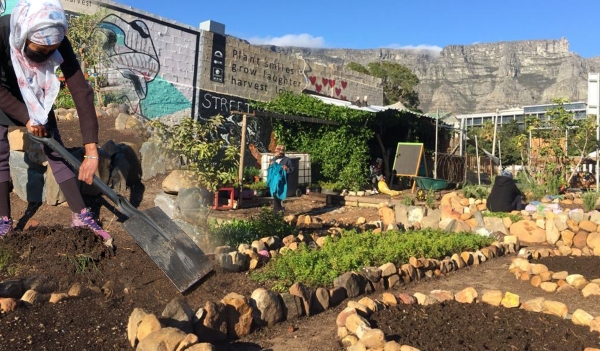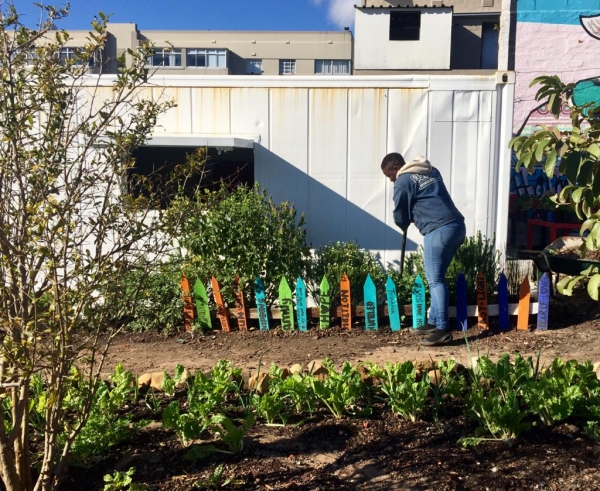Home first: A starting point for the chronically homeless?

During the day, Jody* works in the Khulisa Streetscapes vegetable garden in Cape Town then skarrels after work to supplement her income before returning to her sleeping spot outside. "It's cold, but I'm used to it. I am now 11 years outside. We have blankets and throw cardboard [with a big piece of] plastic on top when it is raining."
Photo: Andrea Teagle
On a crisp June morning over two months after COVID-19 lockdown was announced, Cape Town was eerily quiet. Stripped of its bustling crowds of city workers and tourists, much of the movement on the streets was that of homeless people wrapped in their blankets and setting off for another day of skarreling — slang for their daily hustle for money. For some, the lockdown has kick-started new choices, partly because they found a place to call ‘home’. Antoinette Oosthuizen reports on a housing project in the city that is being evaluated by the HSRC.
The worst part of being addicted is waking up in the morning needing a fix, says Sam*(30), who managed to stop smoking heroin during lockdown: “You crave, your stomach is cramping, you must smoke, you cannot do anything, you are just lam [paralysed]. You must smoke to feel normal again.”
His challenge was particularly gruelling because until recently he was also homeless.
In May, he moved into a house in a Cape Town suburb to participate in a supportive housing programme, which the HSRC is helping Khulisa Social Solutions to evaluate.
Sam used to share the streets with about 8000 homeless Capetonians, but the true number is likely closer to 10 000–15 000 in the metropole alone, says Jesse Laitinen, Khulisa’s strategic partnerships manager.
Khulisa’s Streetscapes project runs a community-based rehabilitation and reintegration programme for chronically homeless people in Cape Town. Most have lived on the streets for years or decades and also have substance use or mental-health issues. Most shelters require abstinence, so they refuse to sleep there, says Laitinen. Being viewed as antisocial or criminal has contributed to their marginalisation.
Also, most shelters provide temporary housing, another reflection of the system not acknowledging urban poverty as a permanent aspect of city spaces. “It is a huge structural problem and we have to innovate around it. What we see as chaos - the drug users and ‘antisocial’ behaviour — is not chaos. It’s the new phase of how our cities are.” We have to start incorporating it instead of thinking that they can be shipped out, she says.
The Streetscapes project is informed by successes of the ‘housing first’ approach in the Northern Hemisphere. The principle is that people are better able to move forward to deal with their substance abuse and mental-health challenges if first homed and then supported. The project is looking at how this approach can be adapted to the South African context.
Streetscapes has two houses, one in Kuils River and the other in Walmer Estate. Residents participate in supported employment programmes and receive psychosocial support. Services are aligned to harm reduction, which is client-driven. Instead of rigid abstinence-based goals, the programme aims to create empowering and non-judgemental relationships with residents, who are encouraged to set their own goals.
The importance of choice
In Sam’s case, having a home and a job at the Streetscapes vegetable garden has given him a sense of purpose and the courage to tackle his addiction. “You don’t have to do anything when you wake up outside. You don’t have the courage to stand up ... you are feeling cold and hungry ... then you must smoke and you must skarrel. But now I have got myself to stop. I have not been smoking for two months now.”
He hated arriving late at work because of needing to skarrel first to feed his habit, emphasising the fact that it was his decision to quit. Laitinen buys methadone, an opioid maintenance therapy, from the private sector. It helps people to quit by reducing the side-effects of stopping. By June, Sam was in the process of weaning himself off the methadone too.
The new house is home – not only providing a roof over his head after years on the streets, but allowing residents to function as a household.
“We cook our own food, we wash our clothes and we take turns to clean the place. We watch TV ... in the morning, you get up and wash and go to work,” says Sam.
Belinda* (29) is from the Eastern Cape and has been working in the Khulisa vegetable garden for three years. She slept in night shelters until moving into the house in May.“This is a house, not a shelter,” she says, describing the crowded shelter dormitories with little privacy and arguments between women stressed out by their circumstances or angered by a neighbour’s substance abuse or habit to steal.
She learns a lot at the vegetable garden. “When there is a new person, I teach them. I love it here and plan to stay and work as much as I can.” Jody* (29) stayed in the house for a month before returning to her spot in the Bo-Kaap, where she’d been sleeping outside for 11 years.
“It’s just my circumstances. You see, my problem is because I use drugs, every day I need to smoke these drugs but I don’t have the money and things ... I don’t want to break the people’s hearts inside the house ... it is nice there and everything; they are living like a big family.”
She has tried methadone, but it did not work for her. She wants to stop using and says she will try again when she is ready. In the meantime, she will continue to skarrel and sleep in her old spot after her day’s work at the vegetable garden.
“All of us have our own decisions in life and make our own choices,” she adds.
Sam, Jody and Belinda agree that it is almost impossible for heavily substance-dependent people to sleep in traditional shelters, due to the curfews and strict abstinence rules. Going 12 hours without using is torture, and many users hustle to get enough money for their fixes long past the 20h00 curfews of shelters.
After returning to the streets during lockdown, Jody found hustling at traffic lights particularly lucrative. “I never used to skarrel at the robots. … After work, I [would] go and beg to maintain my habit, but now, ever since the start of the lockdown, I started skarreling [at the robots] ... you get food by the robot, you get anything. I think some people have asked them to help the homeless people,” she says.
The HSRC support
Dr Donald Skinner, a research director in the HSRC’s Human and Social Capabilities division, says the homeless population constitutes one of the most vulnerable groups in society.
“The HSRC has a history of research with the homeless and is amongst the few academic structures doing ongoing research in the area. This work began about 18 months ago and initially focused on Khulisa programmes. It is now broadening to other NGOs and state structures, including the Department of Social Development (DSD).”
The HSRC and Khulisa jointly developed the research methodology. The Khulisa staff collected most of the initial data and later the HSRC will conduct qualitative interviews with staff and beneficiaries.
“The HSRC will lead the data analysis, but the interpretation will be done jointly with the Khulisa team. Success will be determined by looking at the overall management and maintenance of the house, the health and well-being of beneficiaries, their movement towards leaving the streets, and their success in bringing their substance use under control,” says Skinner.
With these small residential sites increasingly seen as an option for those wishing to transition from living on the streets, this will be an important study in understanding the dynamics in such houses, the usefulness and contribution of different programmes and the potential of this approach. This work will need to be seen in conjunction with research on similar interventions by other NGOs and the DSD.
*not their real names
Author: Antoinette Oosthuizen, a science writer in the HSRC’s Impact Centre
aoosthuizen@hsrc.ac.za
Contact the researchers and Khulisa:
Dr Donald Skinner
dskinner@hsrc.ac.za
Jesse Laitinen
jesse@khulisa.org.za

Belinda* busy in the Khulisa Streetscapes vegetable garden where she has been working for a few years. She came from the Eastern Cape to Cape Town to look for a job. "There, it was so dry in the deep rural area, we didn't have anything, no money ... the poverty was too much."
Photo: Antoinette Oosthuizen
